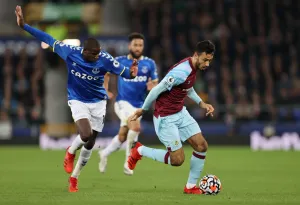A Tale of Two Clubs
In English football, the margins between survival and relegation are measured in points, goals, and sometimes even inches. For Burnley in the 2021-22 season, the margin was four points. A single win might have kept them in the Premier League, securing another year of top-flight revenue, prestige, and the ability to attract players capable of taking the club forward.
Instead, Burnley dropped into the Championship. For a club of modest means, that relegation was a financial earthquake. Parachute payments softened the blow, but the gulf in broadcasting revenue between the two divisions is vast: roughly £100 million separates survival from relegation.
Two years later, Burnley are no longer simply lamenting their fate. They are taking legal action against Everton — the club who finished 16th in that very season — arguing that Everton’s breach of the Premier League’s Profit & Sustainability Rules (PSR) unfairly tilted the playing field.
If they succeed, the implications could be seismic: not just for Everton, but for how financial breaches are punished, and whether past relegations could be reopened in courtrooms rather than stadiums.
🚨 Burnley are preparing to SUE Everton!
— Sleeper Football (@SleeperFooty) September 16, 2025
Their case revolves around the 2021/22 season - in which Everton breached PSR rules. ❌
They were not applied with a points deduction until 2023, although had it been applied at the time, Burnley would've stayed up! 👀 pic.twitter.com/LqeDBdpYUi
Understanding the Rules: What Is PSR?
The Premier League’s Profit & Sustainability Rules (PSR) are the domestic equivalent of UEFA’s Financial Fair Play system. The principle is simple: clubs should not spend recklessly beyond their means.
- The threshold: Clubs can lose up to £105 million over three seasons. Anything beyond that requires justification or risks sanctions.
- Exemptions: Spending on youth academies, women’s football, community projects, or stadium infrastructure is excluded. The intent is to encourage investment in sustainable growth while curbing reckless transfer splurges.
- Sanctions: Breaches are met with independent commission hearings and punishments ranging from fines to points deductions.
The goal is to maintain a balance: allowing clubs to compete and invest, but ensuring they do so responsibly, without jeopardizing their long-term health.
But as Burnley argue, enforcement and timing matter just as much as the rules themselves.
Everton breached PSR in 21/22 & 22/23 and avoided relegation.
— EFCTRUTH & OPINIONS (@efctruth20802) March 13, 2025
Both breaches were punished in 23/24
Burnley seem to be the only club seeking compensation - they are the club that finished 18th in 21/22 https://t.co/GIIss0zLYm pic.twitter.com/HUeRD0pB32
Everton’s Breaches and the Points Deduction
The independent commission found Everton guilty of overspending, reporting losses of £124.5 million over the three-year cycle ending in 2021-22 — comfortably over the £105 million threshold.
The sanctions, however, didn’t arrive until November 2023, more than a year after Burnley’s relegation. Everton were docked 10 points, later reduced to six on appeal. A further two points were deducted for breaches in the following financial period.
Had that six-point deduction been applied in 2021-22, Everton would have been relegated instead of Burnley. That is the core of Burnley’s case: they were not relegated on sporting merit alone, but because Everton benefited from financial irregularities that weren’t punished in time.
🗞️Mark Howard KC will lead Everton’s defence against Burnley’s compensation claim against Everton for their ‘breach’ of PSR. The trial will start in the Summer
— 𝗧𝗵𝗲 𝗧𝗼𝗳𝗳𝗲𝗲 𝗕𝗹𝘂𝗲𝘀 (@EvertonNewsFeed) March 12, 2025
(Source - @TheLawyermag ) pic.twitter.com/RtN1puL49R
Burnley’s Claim: Football Meets the Courtroom
Burnley are seeking damages believed to exceed £50 million, a figure designed to reflect lost Premier League broadcasting money, sponsorship opportunities, and the knock-on effects of relegation.
The case is being heard at the International Dispute Resolution Centre in London, a venue more commonly associated with commercial disputes than football rivalries. But the stakes are every bit as emotional.
For Burnley, this is about justice and survival. For Everton, it is about reputation, finances, and setting a precedent that could either close the door on future claims or blow it wide open.
🚨Burnley’s compensation case against Everton is due to start this week
— EFC DAILY (@EFCdaily_) September 15, 2025
Burnley claim they are owed over £50M after Everton were found in breach of the Premier League’s PSR. [@MsiDouglas] pic.twitter.com/YXRVaps0pU
The Legal Hurdles
Causation
Burnley must prove that Everton’s overspending directly influenced results — that players acquired or retained through unsustainable spending tilted games in Everton’s favour. This is difficult, because football outcomes are rarely reducible to finances alone.
Timing
Everton were sanctioned later. Their lawyers will argue that retroactively applying a penalty to 2021-22 is both impractical and unfair, as clubs must play under the rules of that season as they stood.
Quantifying Losses
Even if Burnley prove liability, how do you calculate damages? Should compensation equal the exact financial difference between the Premier League and Championship? Or should parachute payments and Burnley’s later promotion reduce the claim?
Precedent
If Burnley succeed, doors open for other clubs. Leeds, Leicester, Southampton, and others relegated near the margins may scrutinize rivals’ accounts with lawyers in tow.
Why This Matters Beyond Two Clubs
This isn’t just about Burnley clawing back money or Everton defending their books. It goes deeper:
- Enforcement Speed: The Premier League may be pressured to resolve breaches in real time, rather than years later. Imagine a season where points deductions are applied in March, changing relegation battles before the final day.
- Integrity of Competition: If clubs can show they were relegated unfairly, the league risks undermining its competitive credibility. Matches are supposed to be decided on the pitch, not in financial statements.
- Financial Conservatism: Clubs may grow more cautious with spending, unwilling to risk lawsuits from relegated sides. This could lead to a more even financial landscape — or it could widen gaps if wealthy clubs are confident in gaming the system.
Comparisons and Precedents
This case echoes disputes in Italy’s Serie A and UEFA’s Financial Fair Play system. Juventus, for example, have faced points deductions over financial mismanagement, with punishments applied swiftly enough to affect ongoing seasons.
In England, Nottingham Forest were also penalized for PSR breaches, but their punishment came quickly enough to shape the 2023-24 season’s relegation battle. Burnley’s argument hinges on the claim that they were denied the same clarity.
The Human Element
For Burnley’s fans, this is not an abstract matter of accountancy. Relegation changes everything: the calibre of signings, the future of academy prospects, ticket sales, and the simple joy of seeing their club compete against the best.
For Everton fans, the narrative is equally raw. A founding member of the Football League, Everton pride themselves on being ever-present in the top division. To them, this legal battle feels like an attempt to erase their survival and tarnish their legacy.
A devastating end to the season, as our relegation is confirmed.#UTC
— Burnley FC (@BurnleyOfficial) May 22, 2022
What Happens Next?
- Possible Settlement: Everton may prefer to settle, paying Burnley an undisclosed sum to avoid a public ruling.
- Trial and Appeal: If it goes the distance, expect years of appeals. Legal clarity will take time.
- Wider Fallout: Other clubs will watch closely. If Burnley succeed, expect more lawsuits. If they fail, it may reinforce the Premier League’s authority to enforce rules on its own timeline.
A Turning Point in English Football
The Burnley vs Everton dispute is more than a relegation grudge. It is a test case for how English football handles financial fairness, enforcement, and accountability.
The outcome could redefine what it means to be relegated “fairly.” It could change how quickly sanctions are applied, how damages are calculated, and whether the courtroom becomes the new battleground of the Premier League.
For now, Burnley and Everton are opponents not on the pitch, but in the heart of London’s legal system. The result could echo for years across every relegation fight, every spending spree, and every survival celebration in the Premier League.




